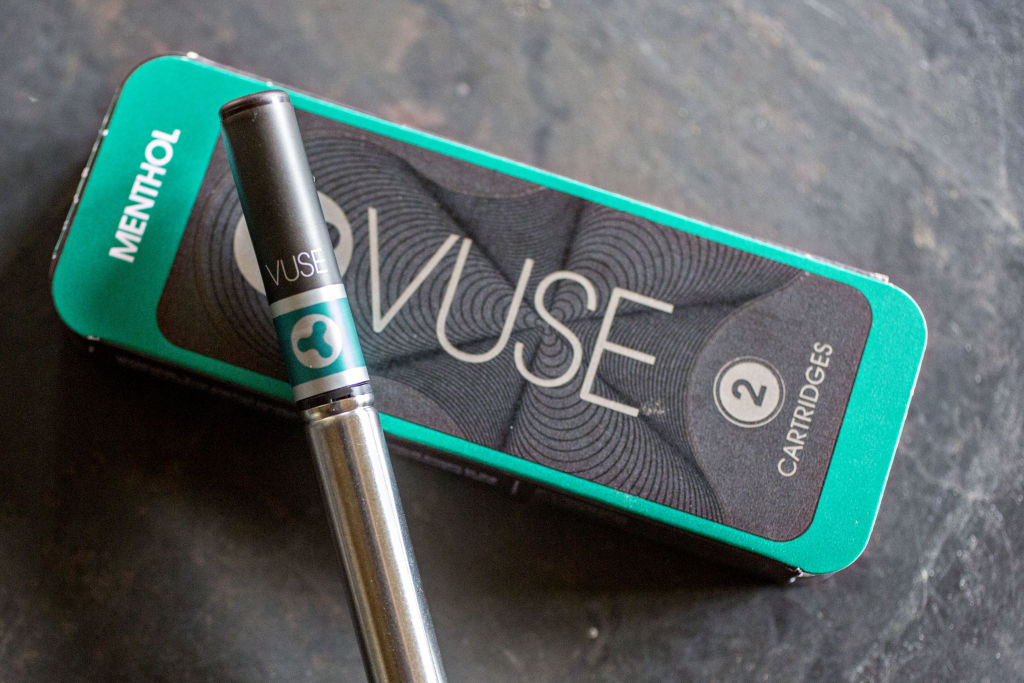
The U.S. Food and Drug Administration authorized British American Tobacco Plc’s e-cigarette Vuse and its tobacco-flavored pods, the first major e-cigarette products cleared in a sweeping review of whether millions of cigarette alternatives have a public-health benefit.
Vuse is the first vape-type product from a major company to win FDA backing to continue U.S. sales, with the agency saying it can help users reduce exposure to harmful chemicals. The FDA is working through millions of applications — including some from BAT competitors such as Juul Labs Inc. While the products under review have already been sold in the U.S., the companies need the FDA’s approval to keep marketing them. A denial by the agency would mean companies could face enforcement action if they try to continue sales.
The agency denied BAT’s request to sell flavored Vuse products, saying those must be removed from the market. It’s still evaluating a proposal to keep selling a menthol version.
Stakes are high for the FDA to decide on the benefit of such products given that Covid-19 has intensified concerns about lung health. A spate of lung illnesses in 2019 also scared some vape users back to smoking, increasing the pressure for an authoritative decision on whether alternative products are safer.
BAT’s American depositary receipts initially spiked before retreating to around unchanged after the announcement. Shares of Altria Group Inc., which competes with BAT through its 35% stake in Juul Labs, moved similarly.
“Today’s authorizations are an important step toward ensuring all new tobacco products undergo the FDA’s robust, scientific premarket evaluation,” Mitch Zeller, director of the FDA’s Center for Tobacco Products, said in a statement. “The manufacturer’s data demonstrates its tobacco-flavored products could benefit addicted adult smokers who switch to these products –- either completely or with a significant reduction in cigarette consumption –- by reducing their exposure to harmful chemicals.”
The FDA’s authorization applied to R.J. Reynolds’s Vuse Solo device and its accompanying tobacco-flavored e-liquid pods, allowing them to be legally sold in the U.S. BAT didn’t immediately respond to a message seeking comment.
Health and teen use of e-cigarettes remain major concerns
The FDA’s decisions could make or break fortunes for cigarette companies, which are increasingly diversifying into alternatives like e-cigarettes and oral nicotine pouches, and for rival upstarts that make competing next-generation nicotine products.
The stakes are also huge for public health. The long-term effects of many alternative nicotine products have yet to be fully studied. On the other hand, traditional tobacco products, which they seek to replace, kill an estimated 8 million people around the world every year, and more than 1.3 billion people still use them, mostly in the form of cigarettes, according to the World Health Organization.
Advocates of e-cigarettes have said that if an internationally-recognized agency like the FDA authorizes them, it could speed up a global shift away from smoking. On the other hand, public health advocates say the cigarette alternatives are addicting younger people to nicotine in different form, and potentially dosing them with other little-known compounds, leading to a new cycle of harm.
The FDA has said teen use has been a top concern. In its Tuesday statement, the agency said that it took note of a recent survey that showed about 10% of high-school students who use e-cigarettes said their brand was Vuse. At the same time, the FDA said, the data showed most of them had started with “flavors such as fruit, candy or mint, and not tobacco flavors,” and that this information in particular reinforced its decision to approve only the tobacco-flavored products.
FDA caught between tobacco companies and health groups
“It’s a complex landscape,” Ben Haas, a partner at Latham & Watkins LLP, said in an interview before the announcement. Haas said the FDA could be sued by tobacco companies if it doesn’t approve their products — or sued by public health groups if it does.
The agency has already authorized a handful of products under its so-called PMTA process, or premarket tobacco product application: IQOS, a heat-not-burn device made by Philip Morris International Inc. and marketed in the U.S. by Altria; an oral tobacco from Swedish Match AB; and low-nicotine cigarettes from 22nd Century Group Inc. All of them took two to three years and included multiple rounds of back-and-forth with the companies.
The FDA’s decisions may alter the playing field by wiping out competing products. Companies with the most at stake include Altria, the maker of U.S. Marlboros, which has 35 applications for various flavors and nicotine strengths of On!, an oral tobacco product in which it has an 80% stake.
Juul has an application for its vape device, which covers menthol and tobacco-flavored versions in both 3% and 5% concentrations of nicotine. Its outcome will be closely watched considering Altria has already taken huge writedowns on its Juul investment and forsaken its own vape products to focus on Juul’s.
BAT had a total of seven applications, including some for Velo, an oral tobacco product.
Imperial Brands Plc has multiple outstanding PMTA applications for its MyBlu vaping pods system.
The lack of a decision on Vuse’s menthol products will leave companies and investors guessing how the FDA will act on menthol in cigarette alternatives, after the agency said earlier this year that it plans to ban it in cigarettes because it heightens addiction.
—With assistance from Corinne Gretler
More Must-Reads from TIME
- Breaking Down the 2024 Election Calendar
- How Nayib Bukele’s ‘Iron Fist’ Has Transformed El Salvador
- What if Ultra-Processed Foods Aren’t as Bad as You Think?
- How Ukraine Beat Russia in the Battle of the Black Sea
- Long COVID Looks Different in Kids
- How Project 2025 Would Jeopardize Americans’ Health
- What a $129 Frying Pan Says About America’s Eating Habits
- The 32 Most Anticipated Books of Fall 2024
Contact us at letters@time.com